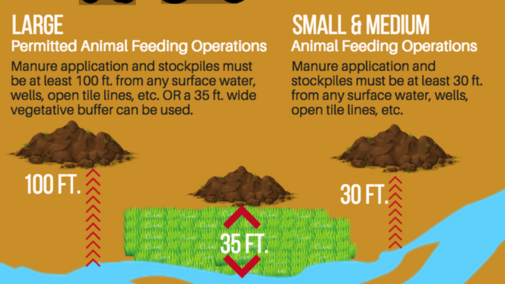A blanket of fresh white snow and icicles hanging from the trees and fences make for beautiful winter photos. They don’t, however, make for beautiful manure application weather.
One of the key rules of manure management is to pump and spread manure whenever weather and field conditions allow so that you can maintain storage capacity in case of inclement weather. Unfortunately, “perfect manure application weather” is rare and seldom lasts as long as you need it to. So, if you’re heading into winter with a manure storage that hasn’t been pumped down as much as it needs to be, consider these tips when planning for application.
Where to Apply
If possible, avoid applying manure on fields with slopes; sloped land presents a greater risk for erosion and runoff. Consider applying manure on the more level ground, well away from ditches or water bodies. Try to apply manure on ground having at least 30% crop residue cover as this reduces the chances of manure runoff during the heavy precipitation events and snowmelt. Compared to fine textured soils, choose coarse texture soil for manure application as sandy soils have more infiltration rate and reduces the chances of nutrients runoff. Planting cover crops in fields used for manure application also reduces the risk for nutrient runoff losses. Cover crops also reduce the risk for nitrate leaching since the plants use applied nutrients during growth; further, they release stored nutrients into the soil during their decomposition in the summer growing season.
For permitted livestock operations, a Phosphorus Index should have been completed for all fields receiving manure. This assessment of risk to surface water can also be used to identify lower-risk fields for winter emergency applications. Check with your advisor or contact the UNL manure team for how your P-Index might be used for this purpose.
When to Apply
It is best practice to apply manure outside of winter when the soil is dry and there is less risk of potential nutrient loss (See Figure 1). However, application of manure during winter months can be accomplished with low risk for runoff when certain conditions are met. In general, manure application should be avoided when fields are snow covered. If manure application cannot be avoided when soil is frozen or snow-covered, it is critical to recognize the runoff risks associated with solid vs. liquid manures before making manure application decisions.

